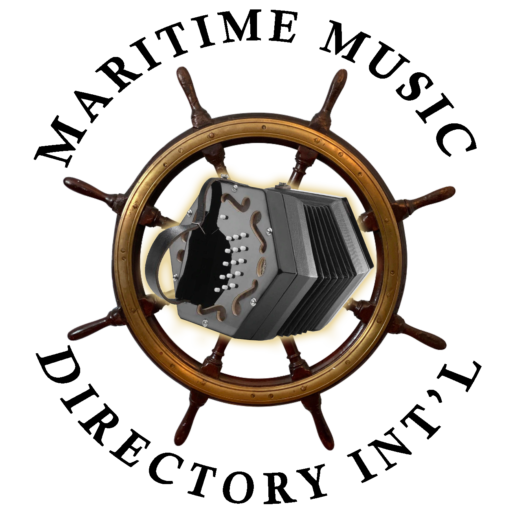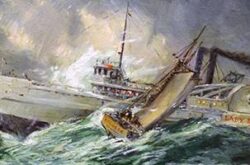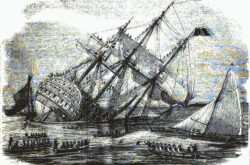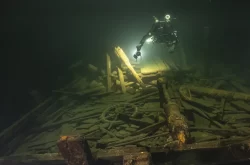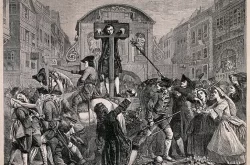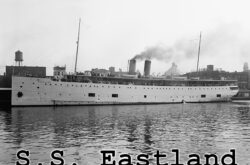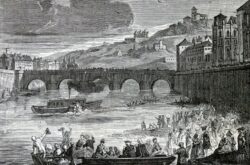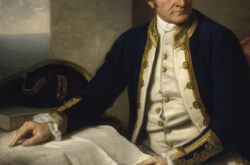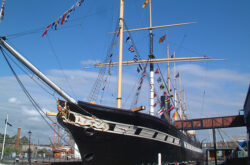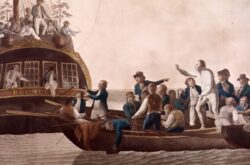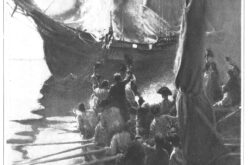Battle of Lake Erie (10 Sept 1813)
In the first unqualified defeat of a British naval squadron in history, U.S. Captain Oliver Hazard Perry leads a fleet of nine American ships to victory over a squadron . . .
Lady Elgin Sinks off Winnetka, Illinois (1860)
The loss of the side-wheel steamship Lady Elgin was one of Lake Michigan’s most tragic maritime disasters. On September 8, 1860, the ship, returning to Milwaukee from . . .
Sir Robert Dudley Dies (6 Sept 1649)
Sir Robert Dudley (7 August 1574 – 6 September 1649) was an English explorer and cartographer. In 1594, he led an expedition to the West Indies, of which he wrote an account. . . .
Bruce Macartney Jr. Dies (2019)
Bruce Jesse Macartney Jr., 70 of Midland, died Thursday morning, September 5, 2019 at the MidMichigan Regional Medical Center. He was born May 22, 1949 in Philadelphia, . . .
Royal George Sinks During Refitting 29 Aug 1782
Royal George sank on 29 August 1782 whilst anchored at Spithead off Portsmouth. The ship was intentionally rolled so maintenance could be performed on the hull, but the . . .
A 19th-century shipwreck is filled with Champagne bottles and Sweden won’t allow anyone a sip
COPENHAGEN, Denmark (AP) — No one will be allowed to fish out any of the nearly 100 bottles of 19th-century Champagne and mineral water nestled in a shipwreck off southern . . .
Louisa Jo Killen Dies 9 August 2013
Louisa Jo Killen (born Louis Killen; 10 January 1934 – 9 August 2013) was an English folk singer from Gateshead, Tyneside, who accompanied himself on the English concertina.
Killen . . .
Effingham fights Battle of Gravelines vs. the Spanish Armada (8 Aug 1588)
Five Spanish ships were lost. The galleass San Lorenzo, flagship of Don Hugo de Moncada, ran aground at Calais and was taken by Howard after murderous fighting between the . . .
Nelson Wins Battle of the Nile (1 August 1798)
On 1st August 1798, Nelson led his fleet into action against the French fleet anchored at the mouth of the Nile in Aboukir Bay, Egypt. In a fierce action, fought in the . . .
Robinson Crusoe Author Spends Final Day in Pillory (31 July 1703)
Daniel Defoe of Robinson Crusoe fame spent the last of his three days in the pillory after being convicted of seditious libel. He was surrounded at the pillory by his supporters, . . .
England Defeats Spanish Armada (29 July, 1588)
Off the coast of Gravelines, France, Spain’s so-called “Invincible Armada” is defeated by an English naval force under the command of Lord Charles Howard and Sir Francis . . .
Hundreds drown in Eastland disaster (24 July 1915)
On July 24, 1915, the steamer Eastland overturns in the Chicago River, drowning between 800 and 850 of its passengers who were heading to a picnic. The disaster was caused . . .
Experimental Steam Ship, Pyroscaphe, travels the Saone (15 July 1783)
15 July 1783 The Marquis de Jouffroy d’Abbans demonstrated his experimental steamship, the Pyroscaphe, on the river Saone at Lyon. An early form of paddle steamer, the . . .
Cook Begins his third voyage (12 July 1776)
James Cook’s third and final voyage took the route from Plymouth via Tenerife and Cape Town to New Zealand and the Hawaiian Islands, and along the North American coast to the Bering Strait.
At . . .
SS Great Britain returns to Bristol Harbour after 127 years (1970)
In 1970, after Great Britain had been abandoned for 33 years, Sir Jack Arnold Hayward, OBE (1923–2015) paid for the vessel to be raised and repaired enough to be towed . . .
Construction on the Erie Canal begins 4 July 1817
On July 4, 1817, workers break ground on the Erie Canal at Rome, New York. The canal, completed in 1825, links the eastern seaboard with the Midwest and transforms New York . . .
Henry Hudson Set Adrift by mutineers (1611)
After spending a winter trapped by ice in present-day Hudson Bay, the starving crew of the Discovery mutinies against its captain, English navigator Henry Hudson, and . . .
Drake Claims California for England (1579)
During his circumnavigation of the world, English seaman Francis Drake anchors in a harbor just north of present-day San Francisco, California, and on 17 June, 1579, claims . . .
Bounty Mutiny Survivors Reach Timor (14 June,1789)
On April 28, Fletcher Christian, the master’s mate on the Bounty, led a successful mutiny against Captain Bligh and his supporters. The British naval vessel had been transporting . . .
British vessel burned off Rhode Island (9 June,1772)
In an incident that some regard as the first naval engagement of the American Revolution, colonists board the Gaspee, a British vessel that ran aground off the coast of . . .
